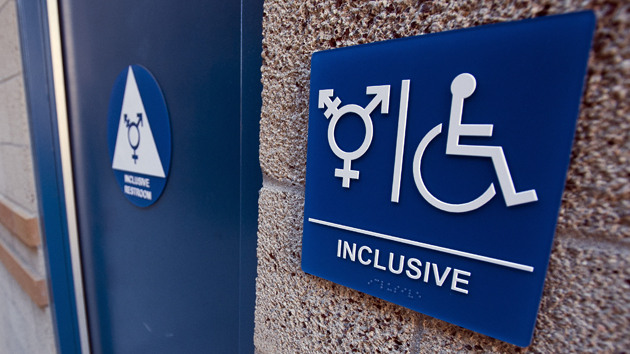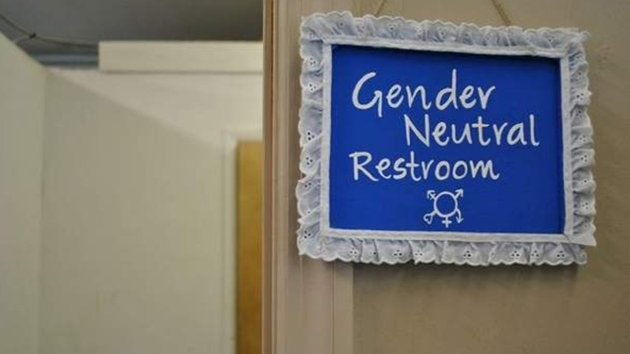
David Bro/ZUMA
If lawmakers in Florida, Texas, and Kentucky have their way, transgender people would be breaking the law when using the bathroom of their choice. Bills introduced in three states over the past month would make it illegal for an individual of one biological sex to enter a single-sex restroom or changing room designated for the opposite sex—even if the individual self-identifies as a person who belongs there.
The debate over which bathrooms transgender individuals can use isn’t particularly new: Lawmakers in 17 states and more than 200 cities have passed laws prohibiting discrimination based on gender identity, while a handful of states and localities, like Colorado and Arizona, have attempted and failed to pass bills that restrict bathroom usage.
But the latest attempts have the benefit of support from the Alliance Defending Freedom, a conservative legal advocacy group based in Arizona that has poured legal and lobbying resources into the issue over the past year. ADF, which has a $30 million annual budget and a network of some 2,000 attorneys, takes on many causes dear to the religious right, including opposition to LGBT rights like marriage, military service, and adoption. ADF’s defense of “religious freedom” has included a determined, years-long fight to make homosexuality illegal in Belize.
The road to the rest room legislation often originates on the local level, with disputes in school districts. Last year, for example, Kentucky’s Atherton High School passed a policy that prohibited segregation of school spaces based on gender. After local parents, represented by an ADF lawyer, failed in their appeal, Republicans in the Kentucky Senate took notice and drafted a law aimed at overturning the policy.
In December, after school districts in Minnesota, Wisconsin, and Rhode Island established nondiscrimination policies, ADF sent emails to school districts across the country. “Your school district may be facing an issue,” the email reads, “that an increasing number of school districts across the country are wrestling with: requests by students struggling with gender identity issues to use the bathrooms, locker rooms, or shower rooms of the opposite sex.” Schools are encouraged to adopt ADF’s model policy, which prohibits transgender students from using the restroom corresponding to their gender identity. If the school district encounters legal backlash, the letter says, ADF lawyers would take on the case, free of charge.
ADF declined to comment on its involvement with bills introduced in Kentucky, Texas, and Florida, but ADF’s counsel Kellie Fiedorek did say that it “has advised and is willing to advise policymakers and others leaders across the country on policies that protect the privacy, safety, and dignity of all citizens in restrooms and locker rooms.” She added that ADF sympathizes “with those that have difficult personal issues to work through,” presumably referring to transgender individuals.
Here are the details on the latest bills:
- A Texas bill states that a person who enters a public restroom, shower, or changing room for the sex different from the “gender established by the individual’s chromosomes” faces a misdemeanor, punishable by up to a year in jail and a fine up to $4,000. Furthermore, the “operator, manager, superintendent, or other person with authority over a building” who repeatedly permits said bathroom entrance would be charged with a felony, punishable by a minimum of 180 days in prison and a fine of up to $10,000.
- The Florida bill applies to both public facilities and workplaces. Gender is defined as “biological sex, either male or female, at birth,” and those who enter a bathroom designated for the opposite gender face a misdemeanor, with up to a year in prison and a fine of up to $1,000.
- The Kentucky bill applies only to school facilities. Transgender students “whose parent or legal guardian provides written consent to school officials shall be provided with the best available accommodation,” it reads. However, “that accommodation shall not include the use of student restrooms, locker rooms, or shower rooms designated for use by students of the opposite biological sex while students of the opposite biological sex are present or could be present.” The bill recently was changed and now doesn’t include a section that explains the punishment for the crime.
Supporters have branded the bills as public safety and privacy measures, and often emphasize the hypothetical situation of men feigning a temporary gender swap to enter women’s bathrooms or changing facilities. As Rep. Frank Artiles, the Miami Republican who’s backing the Florida bill, told the Miami Herald, “A man such as myself can walk into the bathroom at LA Fitness while women are taking showers, changing, and simply walk in there…If I feel like a woman that day, I can be allowed to be in that locker room.” Rep. Debbie Riddle, a Texas Republican, echoed that sentiment in a January Facebook post, saying her bill would protect bathroom-seeking women from “finding a man who feels like he is a woman that day.”
Bathroom choice advocates, including the American Civil Liberties Union and the Transgender Legal Defense and Education Fund, have dubbed the propositions “show your papers to pee” bills, asserting that there is no evidence that trans-inclusive facilities are unsafe and pointing to the 17 states and over 200 cities that have implemented laws prohibiting discrimination based on gender identity. Transgender Law Center’s Sasha Buchert adds the bills are difficult to enforce. “Is someone going to stand at the door and check someone’s chromosomes?” she asks.













